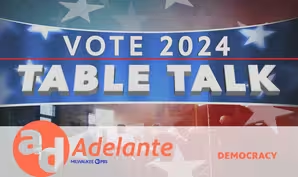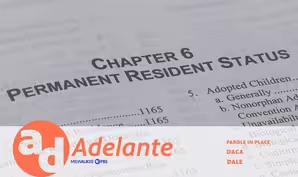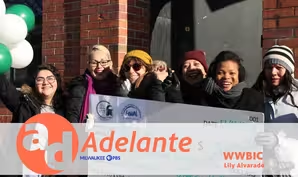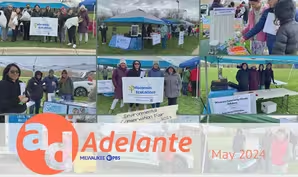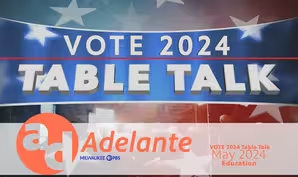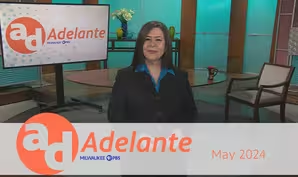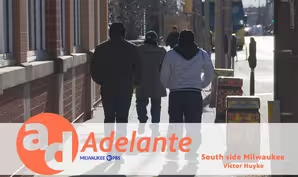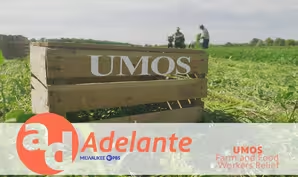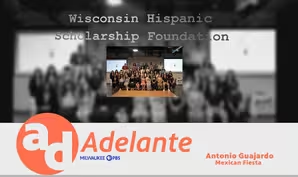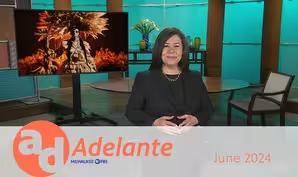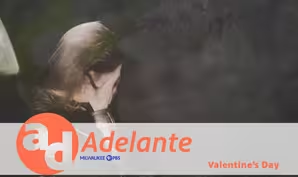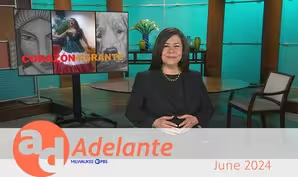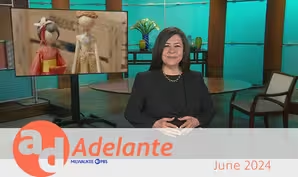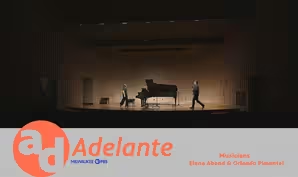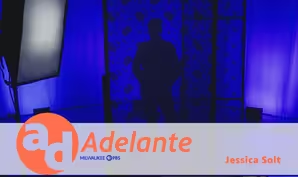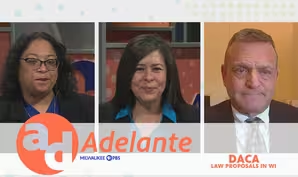Adelante
VOTE 2024 Table Talk and Dr Michael Mendez
Clip: Season 25 | 6m 50sVideo has Closed Captions
VOTE 2024 Table Talk and Dr Michael Mendez
ADELANTE celebrates the rich heritage and issues important both to Latino people and our community at large. This episode highlights the Milwaukee PBS Vote 2024 Table Talk, that Milwaukee PBS held in partnership with Marquette University's Civic Dialogues.
Problems playing video? | Closed Captioning Feedback
Problems playing video? | Closed Captioning Feedback
Adelante is a local public television program presented by MILWAUKEE PBS
This program is made possible in part by the following sponsors: Johnson Controls
Adelante
VOTE 2024 Table Talk and Dr Michael Mendez
Clip: Season 25 | 6m 50sVideo has Closed Captions
ADELANTE celebrates the rich heritage and issues important both to Latino people and our community at large. This episode highlights the Milwaukee PBS Vote 2024 Table Talk, that Milwaukee PBS held in partnership with Marquette University's Civic Dialogues.
Problems playing video? | Closed Captioning Feedback
How to Watch Adelante
Adelante is available to stream on pbs.org and the free PBS App, available on iPhone, Apple TV, Android TV, Android smartphones, Amazon Fire TV, Amazon Fire Tablet, Roku, Samsung Smart TV, and Vizio.
Providing Support for PBS.org
Learn Moreabout PBS online sponsorshipPATRICIA GÓMEZ: En asociación con Civil Dialogues de la Universidad Marquette, Milwaukee PBS y Adelante presentan una serie especial que informa a nuestra audiencia sobre temas claves relacionados con las elecciones presidenciales.
Quédese con nosotros en esta primera de 4 partes de la serie con el tema cambio climático.
[MUSIC PLAYING] AMBER WICHOWSKY: We're bringing voters from a variety of backgrounds together to talk in conversation.
DALE SKAGGS: The Earth is a community.
If we're going to meet those problems well, we can only do it together.
DARRELL TERRELL: Earth is part of who we are.
And that if we're not taking care of the Earth, that is a big problem.
ALEX LEMKE: I think the value that's bringing me here today is humility.
I think these are very complex problems.
CEDRIC BURHKE: What variables are most important?
And then be able to decide a logical outcome based off of the truth.
YESI PEREZ: Just getting back to our roots, that connection to nature and how important it was for my ancestors and many ancestors.
AMBER WICHOWSKY: But climate change also raises questions about environmental justice.
For example, agricultural workers who are disproportionately Latino, they're up to 35 times more likely to die from heat-related stress relative to other workers.
AMBER WICHOWSKY: So I'm wondering when it comes to addressing the needs of individuals and communities disproportionately impacted by climate change, what do you think we should do?
DARRELL TERRELL: I think our first area should be try to create a vision.
I don't think there's any type of change anyone have in any type of situation, if people are not seeing the vision first.
CEDRIC BUHRKE: The people in the federal government, even though they're representative of their people back home, the state government is closer and can regulate their own neighborhoods easier than the federal government can, in terms of financing them as well.
They would be able to utilize resources more efficiently.
YESI PEREZ: In my opinion, have to start in the areas that are feeling it the most, which has been disproportionately advantaged already.
ALEX LEMKE: There are sufficient labor laws in there to create that protection.
And with the downside of, if you're going to go that way, you have to be prepared for massively increased food prices.
So it is a balancing act.
So I think maybe it's I would prefer probably a market solution on that one.
AMBER WICHOWSKY: So you're looking to maybe the producers that's making decisions.
ALEX LEMKE: Producers themselves or moving it down from a federal set to the state level.
DALE SKAGGS You're either going to have farm workers dying or you're going to have super high food prices.
There might be another alternative somewhere out there in the world.
If we get together-- and this brings me back to my first answer to your question, what should we do?
And I think this fits with-- we should go ask the people who are affected what they need?.
[MUSIC PLAYING] PATRICIA GÓMEZ: El doctor Michael Mendez es un profesor asistente de planificación y política ambiental en la Universidad de California, Irvine.
Anteriormente, se desempeñó en California como consultor, cabildero y designado por el gobernador durante la aprobación de la legislación estatal sobre cambio climático que ha sido internacionalmente aclamada.
PATRICIA GÓMEZ: Dr. Mendez, why the climate change is an issue of social justice for Latinos and other groups?
MICHAEL MENDEZ: Throughout the United States, we're experiencing a major climate change crisis and a public health emergency.
Communities of color and particular Latino communities are at the forefront of the disparate and disproportionate impact that we're seeing from our changing climate.
Farmworkers, for instance, 48% of them don't have health insurance.
50% of them are undocumented.
78% of farmworkers identify as Latinos are 35 times more likely to die from extreme heat than other workers and other occupations.
Unfortunately, the policies are not moving fast enough and particularly for those that are most stigmatized and marginalized in society.
This is often because there's a stronger focus on economics and economic imperative versus safeguarding the health and livelihoods and needs of Latino communities.
For example, places like Sonoma and Napa County, there's often a lot of push to safeguard the crops from smoke and ash or from being burned from these wildfires.
But little attention is placed on the actual needs and health of farmworkers who are laboring.
Many of them are undocumented, so they don't have access to the same civil rights and disaster assistance that US legal residents has.
Many of the information is not provided in commonly spoken language.
Some of them are Indigenous.
They may not speak Spanish or English.
What we have seen from these disasters from wildfires to hurricanes and the COVID-19 pandemic, yes, horrible stories of inequality and impacts that have caused so much pain and trauma.
But at the same time, it has showed coalition building and stories of hope, where nonprofits, migrant serving organizations, environmental justice groups, and others have come together to demand justice and demand resources for these communities.
And while the COVID-19 pandemic disproportionately impacted Latinos in general, many of them mentioned that it would have been far worse had they not had that ability to create disaster planning and infrastructure during the extreme wildfire events.
California has been very progressive with immigrant rights, LGBT rights, environmental issues, climate change.
It hasn't always been the case.
But based on those 1990s, organizing protests, conflict-driven advocacy create a new generation of leaders that have been influential in climate change, immigrant rights, health care.
Places like Texas, Arizona, and Nevada, quite possibly even Florida are where California was about 30 or 40 years ago.
There's an opportunity to keep fighting for social change and coalescing together and having hope.
And I think that's what I see in places like Texas and throughout the Southwest and wherever Latinos are facing inequality.
[MUSIC PLAYING]
Video has Closed Captions
Clip: S25 | 5m 18s | Vote 2024 Table Talk - Democracy (5m 18s)
Video has Closed Captions
Clip: S25 | 18m 30s | New immigration policies are offering hope to hundreds of thousands (18m 30s)
Video has Closed Captions
Clip: S25 | 7m 43s | Wisconsin EcoLatinos is a nonprofit, fiscally sponsored by the Center for Community Stewardship (7m 43s)
VOTE 2024 - Table Talk on Education
Video has Closed Captions
Clip: S25 | 8m 18s | Milwaukee PBS partnership with Marquette University's Civic Dialogues. (8m 18s)
VOTE 2024 Table Talk and Dr Michael Mendez
Video has Closed Captions
Clip: S25 | 6m 50s | VOTE 2024 Table Talk and Dr Michael Mendez (6m 50s)
Video has Closed Captions
Clip: S25 | 4m 42s | Víctor Huyke, publicist for the newspaper El Conquistador (4m 42s)
UMOS Farm and Food Workers Relief
Video has Closed Captions
Clip: S25 | 10m 10s | United Migrant Opportunity Service, UMOS (10m 10s)
Mexican Fiesta - Antonio Guajardo
Video has Closed Captions
Clip: S25 | 7m 53s | Mexican Fiesta began in 1973 with the purpose of celebrating Mother's Day & Mexico's independence. (7m 53s)
Julieta Zavala is a fashion design artist in folk art
Video has Closed Captions
Clip: S25 | 6m 23s | Julieta Zavala - fashion design artist in folk art (6m 23s)
Video has Closed Captions
Clip: S25 | 11m 30s | Domestic Violence does not discriminate. (11m 30s)
Video has Closed Captions
Clip: S25 | 12m 29s | Yesica Coria is a Mexican folk artist whose works with corn leaves amaze us. (12m 29s)
Video has Closed Captions
Clip: S25 | 16m 12s | Elena Abend and Orlando Pimentel are married Venezuelan artists. (16m 12s)
Video has Closed Captions
Clip: S25 | 17m 25s | Jessica Solt has a hereditary condition that caused her to have surgery to remove her stomach. (17m 25s)
DACA Law Proposals in Wisconsin
Video has Closed Captions
Clip: S25 | 24m 18s | Immigration Reform has not been consolidated in the US is because Democrats/Republicans don't agree. (24m 18s)
Providing Support for PBS.org
Learn Moreabout PBS online sponsorshipSupport for PBS provided by:
Adelante is a local public television program presented by MILWAUKEE PBS
This program is made possible in part by the following sponsors: Johnson Controls
